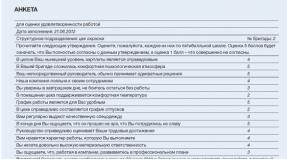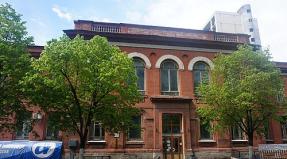Iskander biography. Fazil Iskander short biography. Novel "Sandro from Chegem"
Fazil Abdulovich Iskander- Soviet and Russian prose writer, translator and poet, winner of a number of awards.
Born on March 6, 1929 in Sukhumi in the family of a former brick factory owner of Iranian origin. In 1938, the father of the future writer was deported from the USSR, and Fazil never saw him again. He was raised by relatives of his Abkhaz mother in the village of Chegem. He graduated from a Russian school in Abkhazia with a gold medal. Entered the Library Institute in Moscow. After three years training transferred to the Literary Institute named after. A.M. Gorky, who graduated in 1954.
In 1954-1955, Iskander was a literary employee of the Bryansk Komsomolets newspaper, and in 1955-1956 - of the Kurskaya Pravda newspaper. In 1956 he became an editor in the Abkhaz branch of the State Publishing House, where he worked until the early 1990s. Since the early 1990s he has lived permanently in Moscow. The first book of poems “Mountain Paths” was published in Sukhumi in 1957; in the late 1950s it began to be published in the magazine "Youth". He began writing prose in 1962. The writer became famous in 1966 after publishing in "New World" story "Constellation Kozlotur". He was also published in the publications “Literary Abkhazia”, “ New world», "A week".
Iskander’s main books are written in a unique genre: the epic novel “Sandro from Chegem”, the epic “Chick’s Childhood”, the parable story “Rabbits and Boa Constrictors”, the essay-dialogue “Thinking of Russia and the American”. The plot of many of his works takes place in the village of Chegem, where the author spent a significant part of his childhood.
In 1979, he participated in the creation of the uncensored almanac Metropol, published in the USA, for which he was practically excommunicated from the Soviet press for several years. Only in 1984-1985 new stories by Iskander appeared in periodicals.
Was a member of the jury at the final game Major League KVN 1987. As a public figure and spiritual authority of society, he repeatedly spoke out in defense of small peoples.
Fazil Iskander was a member of the Central Audit Commission of the USSR Writers' Union (1986-1991), co-chairman of the secretariat of the board of the USSR Writers' Union (1991), people's deputy USSR from the Abkhazian Autonomous Soviet Socialist Republic (1989-1992), member of the commissions on State Prizes of Russia, on human rights and pardons under the President of the Russian Federation, the Council for Culture and Art under the President of the Russian Federation. He is also an academician of the Russian Academy of Natural Sciences (1995), a member of the Academy of Russian Art (1995), the Independent Academy of Aesthetics and Liberal Arts (1995), an honorary doctor of Norwich University (USA), a member and laureate of the Bavarian Academy of Fine Arts (Germany).
Currently lives in Moscow, is an elder and the most respected figure in the Moscow Abkhaz diaspora.
Iskander's stories and stories have been translated into almost all European languages. Many films have been made based on Iskander’s works.
Iskander himself admires the poetry of Alexander Pushkin and Joseph Brodsky, the prose of Fyodor Dostoevsky and Ivan Turgenev.
Married since 1960. Wife - poetess Antonina Khlebnikova (Iskander). Has a son, Alexander, and a daughter, Marina. In the spring of 2011, Fazil and Antonina Iskander jointly published a book of poems, “Snow and Grapes.”
Fazil Iskander was awarded a number of prestigious domestic and foreign prizes: the USSR State Prize (1989), the State Prize of the Russian Federation (1993), the A.D. Sakharov “For Courage in Literature” (1991), the Pushkin Prize of the A. Tepfer Foundation (1992), the “Golden Ostap” Prize, Malaparti (Italy), “Triumph” (1998), the RAS commemorative medal “Masterpieces of Russian Literature of the 20th Century” for outstanding contribution to the development of Russian culture (2003). In 2011, Iskander became a laureate of the Yasnaya Polyana literary prize named after L.N. Tolstoy and the winner of the Russian Government Prize for the collection “Selected Works”. By presidential decree he was awarded the Order of Merit for the Fatherland three times in 1999, 2004 and 2009. Awarded the Order of Honor and Glory, 1st degree, of Abkhazia (2002).
Fantasy in the works of Fazil Iskander.
The work of F. Iskander is a unique phenomenon - it combines seemingly incompatible elements. His work contaminates both romantic motifs and images, and the realism of the image, the relevance of the questions posed and stated themes, complex issues, multifaceted characters, clothed in non-trivial images of heroes in order to better reveal their essence.
In his work, Iskander uses many techniques, plays with images and plots, uses myths, fairy tales, allegories and hyperboles. But we will not find science fiction as such in its traditional understanding in the works of Fazil Iskander due to the fact that the author is extraordinary, original and very unconventional, and therefore interesting. His fantasy is implicit, veiled, invisible at first glance, but no less significant for that reason. Fantastic elements are most clearly manifested in the author's philosophical tales. For example, the fairy tale “Rabbits and Boas”, where the heroes are animals, and the action takes place in the State of Rabbits. The Gospel story was also used. This is perhaps the most striking example of the use of fantastic techniques in the writer’s work. Such tales are allegorical and contain vivid elements of fantasy. But fantasy here performs a slightly different function than usual - it is not main element, but at the same time a necessary element. Here, such techniques make it possible to more deeply reveal the essence of the problems posed, to show the depth of the images and stated problems, to expand and deepen space and time, taking them out of a rigid framework.
The story “Constellation of the Goat Turk” tells about the breeding of a new animal - the goat Turk, descended from the mountain aurochs and the domestic goat. Here the author uses both traditional fantasy elements and his favorite techniques. The image of the Kozlotur acts here as a metaphor for a social experiment to create an ideologized person.
In the story “The Dream of God and the Devil,” Iskander turns to biblical themes. The story is a dialogue between God and the devil about people, faith, doubt, truth.
The philosophical fairy tale “Dzhamkhukh - the Son of the Deer, or the Gospel in Chegem” tells about the fate of truth in the world. The plot is based on an Abkhazian legend, but the plot is framed in the form of a fairy tale using its traditional elements (test of the hero, magical helpers). Biblical reminiscences only enhance the semantic depth of the work.
The chronotope of Abkhazia, present in many of the writer’s works (for example, “Sandro from Chegem”) appears before the reader in a fantastic aura. Abkhazia here is akin to some kind of fictional country; it is idealized, close to legendary, even mythical times, endowed with other properties, as if animated. The influence of folklore is very strong here.
Fantastic elements include anthropomorphism and sacralization of nature, animals and trees (“A Tale of the Sea”, “Tea Party and Love of the Sea”, “School Waltz”, “Holy Lake”, “Childhood Tree”, “Big Day” big house"). Iskander’s image of a tree is a separate archetype and symbol - a symbol of life, the development of man and people, a symbol of hope.
Fairy-tale and mythological subjects, as well as allusions to them, contribute to a deeper depiction modern world, expand the boundaries of time and space, deepen the artistic meaning of the narrative due to emerging cultural reminiscences.
Iskander’s prose is complex and multifaceted; behind the external plot there is always an internal subtext, other layers of meaning. So it is with fantasy in his work: it does not lie in a prominent place, but it is in most of his works. The author was influenced by many writers, both past generations and his contemporaries, but skillfully developed his own poetics and unique style. For example, in philosophical and social stories and fairy tales there are echoes of the work of M.E. Saltykov-Shchedrin, in socio-psychological works - M.A. Bulgakov, the author often turns to mythology, using both individual motifs and myths as a whole.
In Sukhum (Abkhazia). His father, Iranian by origin, was expelled from the USSR in 1938, the boy grew up with relatives on his mother’s (Abkhaz) side.
In 1954-1955, Iskander was a literary employee of the Bryansk Komsomolets newspaper, and in 1955-1956 - of the Kurskaya Pravda newspaper.
In 1956 he moved to Sukhum, becoming an editor in the Abkhaz branch of Gosizdat.
The first poetic publications of Fazil Iskander are dated 1952. The poet regularly published his works in the magazine “Literary Abkhazia”.
Iskander's first collection of poems, Mountain Paths, was published in Russian in 1957 in Sukhum.
Since the late 1950s, he has also published in the magazines Yunost, Nedelya and Novy Mir.
The first story was published in 1956 in the Pioneer magazine. In 1966, the writer’s first story, “The Constellation of Kozlotur,” was published in the “New World” magazine.
In 1979, the writer took part in the uncensored almanac "Metropol" (the story "The Little Giant great sex"), published in the USA, for which he was practically excommunicated from the Soviet press for several years. Only in 1984-1985 new stories by Iskander appeared in periodicals.
Among Iskander’s works are poems, short stories, novels, novels: “The Kindness of the Earth” (1959, collection of poems), “Green Rain” (1960, collection of poems), “Youth of the Sea” (1964, collection of poems), “Dawns of the Earth” ( 1966, collection of poems), “The Thirteenth Labor of Hercules” (1966, collection of stories), “Forbidden Fruit” (1966, collection of stories), “Rabbits and Boas” (1987, satirical story), “Sandro from Chegem” (1973-1988 , complete edition - 1989; novel on an autobiographical basis), "Man and His Surroundings" (1993, novel), "Sofichka" (1995, story), etc. In the early 2000s, new books by Iskander were published - "Night Car" , “Where the Dog is Buried,” a ten-volume collection of the writer’s works appeared. New stories were published in magazines ("Goats and Shakespeare", 2001; "Rotten Intelligentsia and Scams", 2001; "The Dream of God and the Devil", 2002, etc.).
Many films have been made based on Iskander’s works. Among the famous film adaptations is Yuri Kara’s film “Thieves in Law” (1988), which is based on the stories “Chegem Carmen” and “Bartender Adgur”. In 1989, two films based on Iskander’s works were released: the film “Constellation of Kozlotur” and the film “The Feasts of Belshazzar, or a Night with Stalin” - an adaptation of the short story “The Feasts of Belshazzar” from the cycle “Sandro of Chegem”. In 1992, the film “Little Giant of Big Sex” was shot with Gennady Khazanov in the title role. The film was an adaptation of Iskander's short story "Oh, Marat!"
Fazil Iskander was a member of the Central Audit Commission of the Union of Writers of the USSR (1986-1991), co-chairman of the secretariat of the board of the USSR Writers' Union (1991), people's deputy of the USSR from the Abkhaz Autonomous Soviet Socialist Republic (1989-1992), member of the commissions on State Prizes of Russia, on human rights and on pardons under the President of the Russian Federation, Council for Culture and Art under the President of the Russian Federation.
Iskander was also an academician of the Russian Academy of Natural Sciences (1995), the Academy of Russian Art (1995), the Independent Academy of Aesthetics and Liberal Arts (1995), an honorary doctor of Norwich University (USA), a member and laureate of the Bavarian Academy of Fine Arts (Germany).
Fazil Iskander was awarded the Order of Merit for the Fatherland, III (1999), II (2004) and IV (2009) degrees, and the Order of Honor and Glory, I degree of Abkhazia (2002).
The writer has received a number of prestigious domestic and foreign awards: the USSR State Prize (1989), the State Prize of the Russian Federation (1993), the A.D. Sakharov "For Courage in Literature" (1991), the Pushkin Prize of the A. Tepfer Foundation (1992), the Golden Ostap Prize, Malaparti (Italy), "Triumph" (1998), the RAS commemorative medal "Masterpieces of Russian Literature of the 20th Century" for outstanding contribution to the development of Russian culture (2003), etc.
In Sukhum (Abkhazia). His father, Iranian by origin, was expelled from the USSR in 1938, the boy grew up with relatives on his mother’s (Abkhaz) side.
In 1954-1955, Iskander was a literary employee of the Bryansk Komsomolets newspaper, and in 1955-1956 - of the Kurskaya Pravda newspaper.
In 1956 he moved to Sukhum, becoming an editor in the Abkhaz branch of Gosizdat.
The first poetic publications of Fazil Iskander are dated 1952. The poet regularly published his works in the magazine “Literary Abkhazia”.
Iskander's first collection of poems, Mountain Paths, was published in Russian in 1957 in Sukhum.
Since the late 1950s, he has also published in the magazines Yunost, Nedelya and Novy Mir.
The first story was published in 1956 in the Pioneer magazine. In 1966, the writer’s first story, “The Constellation of Kozlotur,” was published in the “New World” magazine.
In 1979, the writer took part in the uncensored almanac "Metropol" (the story "The Little Giant of Big Sex"), published in the USA, for which he was practically excommunicated from the Soviet press for several years. Only in 1984-1985 new stories by Iskander appeared in periodicals.
Among Iskander’s works are poems, short stories, novels, novels: “The Kindness of the Earth” (1959, collection of poems), “Green Rain” (1960, collection of poems), “Youth of the Sea” (1964, collection of poems), “Dawns of the Earth” ( 1966, collection of poems), “The Thirteenth Labor of Hercules” (1966, collection of stories), “Forbidden Fruit” (1966, collection of stories), “Rabbits and Boas” (1987, satirical story), “Sandro from Chegem” (1973-1988 , complete edition - 1989; novel on an autobiographical basis), "Man and His Surroundings" (1993, novel), "Sofichka" (1995, story), etc. In the early 2000s, new books by Iskander were published - "Night Car" , “Where the Dog is Buried,” a ten-volume collection of the writer’s works appeared. New stories were published in magazines ("Goats and Shakespeare", 2001; "Rotten Intelligentsia and Scams", 2001; "The Dream of God and the Devil", 2002, etc.).
Many films have been made based on Iskander’s works. Among the famous film adaptations is Yuri Kara’s film “Thieves in Law” (1988), which is based on the stories “Chegem Carmen” and “Bartender Adgur”. In 1989, two films based on Iskander’s works were released: the film “Constellation of Kozlotur” and the film “The Feasts of Belshazzar, or a Night with Stalin” - an adaptation of the short story “The Feasts of Belshazzar” from the cycle “Sandro of Chegem”. In 1992, the film “Little Giant of Big Sex” was shot with Gennady Khazanov in the title role. The film was an adaptation of Iskander's short story "Oh, Marat!"
Fazil Iskander was a member of the Central Audit Commission of the Union of Writers of the USSR (1986-1991), co-chairman of the secretariat of the board of the USSR Writers' Union (1991), people's deputy of the USSR from the Abkhaz Autonomous Soviet Socialist Republic (1989-1992), member of the commissions on State Prizes of Russia, on human rights and on pardons under the President of the Russian Federation, Council for Culture and Art under the President of the Russian Federation.
Iskander was also an academician of the Russian Academy of Natural Sciences (1995), the Academy of Russian Art (1995), the Independent Academy of Aesthetics and Liberal Arts (1995), an honorary doctor of Norwich University (USA), a member and laureate of the Bavarian Academy of Fine Arts (Germany).
Fazil Iskander was awarded the Order of Merit for the Fatherland, III (1999), II (2004) and IV (2009) degrees, and the Order of Honor and Glory, I degree of Abkhazia (2002).
The writer has received a number of prestigious domestic and foreign awards: the USSR State Prize (1989), the State Prize of the Russian Federation (1993), the A.D. Sakharov "For Courage in Literature" (1991), the Pushkin Prize of the A. Tepfer Foundation (1992), the Golden Ostap Prize, Malaparti (Italy), "Triumph" (1998), the RAS commemorative medal "Masterpieces of Russian Literature of the 20th Century" for outstanding contribution to the development of Russian culture (2003), etc.
Writer, screenwriter, actor.
He graduated from high school and received a library education.
In the 1950s, Iskander came to Moscow, entered the Literary Institute, from which he graduated in 1954. Already in his student years he began to publish (first publications in 1952). Writes poems. Works as a journalist in Kursk, then in Bryansk. In 1959 - editor in the Abkhaz department of the State Publishing House.
The first collections of poetry - "Mountain Paths" (1957), "The Kindness of the Earth" (1959), "Green Rain" (1960) and others - received good feedback critics and reader recognition.
Since 1962, his stories began to be published in the magazines "Youth" and "Week". In 1966, the author collected the first book, “Forbidden Fruit,” from these stories.
However, his truly widespread fame comes from the publication in the New World of “Constellations of Kozlotur” (1966). The stories and novellas were warmly received: “On a Summer Day” (1969), “The Tree of Childhood” (1970). Of particular interest in his work was the cycle of short stories “Sandro from Chegem” (1973).
In 1979, for Metropol, Iskander gave the satire “The Little Giant of Big Sex.” Iskander wrote children's stories - "Chick's Day" (1971) and "Chick's Defense" (1983), which formed the basis for the book of stories "Chick's Childhood" (1993). In 1982, the writer’s work, “Rabbits and Boas,” was published in the magazine “Youth,” which was an extraordinary success. In 1987 he published a book of poems, The Path; in 1990 - the story “The Station of Man”; in 1991 - a book of journalism "Poets and Tsars"; in 1993 - “Poems” and the novel “Man and His Surroundings”. In 1995, the story “Sofichka” was published in the magazine “Znamya”.
Abkhazian writer, poet.
Fazil Iskander was born on March 6, 1929 in Sukhumi (Abkhazia), in the family of an Iranian - the owner of a brick factory. In 1938, Fazil's father was expelled from the USSR; The future writer was taken in by his mother's relatives. I graduated from school in Abkhazia. After graduating from school, Fazil Iskander entered the Moscow Library Institute, but in 1951 he transferred to the Literary Institute. A.M. Gorky, graduating in 1954. In 1954-1956 he worked as a journalist in Bryansk (newspaper "Bryansky Komsomolets") and Kursk (newspaper "Kurskaya Pravda"). In 1956 he moved to Sukhumi, becoming an editor in the Abkhaz branch of Gosizdat, where he worked until the early 1990s. Iskander's first collection of poems, "Mountain Paths", was published in Russian in 1957 in Sukhumi. He began writing prose in 1962. He was published in the magazines “Literary Abkhazia”, “Youth”, “New World”, “Week”. Fazil Iskander is the winner of numerous awards, including the Pushkin Prize (1993) and the Triumph Prize (1999). Lives in Moscow.
Among the works of Fazil Iskander are poems, short stories, novellas, scripts: “Mountain Paths” (1957, collection of poems), “The Kindness of the Earth” (1959, collection of poems), “Green Rain” (1960, collection of poems), “Children Black Sea" (1961, collection of poems), "Youth of the Sea" (1964, collection of poems), "Dawns of the Earth" (1966, collection of poems), "Constellation Kozlotur" (1966, satirical story), "The Thirteenth Labor of Hercules" (1966, collection of stories), "Forbidden Fruit" (1966, collection of stories), "The Beginning" (1969, story), "Trout Fishing in the Upper Kodor River" (1969, story), "On a Summer Day" (1969, story), "Letter" (1969, story), "Meeting on the Train" (1969, story), "Poor Demagogue" (1969, story), "Sandro from Chegem" (1973-1988, complete edition - 1989; novel on an autobiographical basis; some chapters were filmed in 1989 - the film "The Feasts of Belshazzar, or a Night with Stalin"), "The Sea Scorpion" (1977, story), "Oh, Marat!" (1979, story; filmed in 1992 - the film "Little Giant of Big Sex", Russia, "Mosfilm"), "Rabbits and Boas" (1982, USA; published in Moscow in 1987, satirical fairy tale), "Chick's Defense" (1983, story), "Bartender Adgur" (1986, story), "Chegemskaya Carmen (1986, story; filmed in 1988 - the film "Thieves in Law", USSR, M. Gorky Film Studio), "The Light of Gloomy Youth" (1990, story), “Man and His Surroundings” (1992-1993, novel), “Sofichka” (1995, story), “Thinking about Russia and the American” (1997, story), stories about Chika, film script writer “The Time of Happy Finds” (1969-1970, film script together with G.S. Gabai; “Mosfilm”), “The Chegem Detective” (1986; USSR, “Mosfilm”, “Gruziyafilm”), “Belshazzar’s Feasts, or the Night of Stalin" (1989; USSR, M. Gorky Film Studio).
Fazil Iskander was born on March 6, 1929 in Sukhumi in the family of a former brick factory owner of Iranian origin. In 1938, the father of the future writer was deported from the USSR, Fazil never saw him again in his life. He was raised by relatives of his Abkhaz mother in the village of Chegem.
He graduated from a Russian school in Abkhazia with a gold medal. Entered the Library Institute in Moscow. After three years of study, he transferred to the Literary Institute. A. M. Gorky, who graduated in 1954.
In 1954-1956 he worked as a journalist in Kursk and Bryansk. In 1956 he became an editor in the Abkhaz branch of the State Publishing House, where he worked until the early 1990s. Since the early 1990s he has lived permanently in Moscow.
The first book of poems, “Mountain Paths,” was published in Sukhumi in 1957; at the end of the 1950s, it began to be published in the magazine “Youth.” He began writing prose in 1962. The writer became famous in 1966 after the publication of the story “Constellation of Kozlotur” in Novy Mir.
Iskander’s main books are written in a unique genre: the epic novel “Sandro from Chegem”, the epic about childhood “Chika”, the parable story “Rabbits and Boa Constrictors”, the dialogue story “Thinking of Russia and the American”. Also popular are the stories “Man and His Surroundings”, “The School Waltz, or the Energy of Shame”, “The Poet”, “The Stand of a Man”, “Sofichka”, the stories: “The Thirteenth Labor of Hercules”, “The Beginning”, “The Rooster”, “ A Story about the Sea", "Grandfather" and other works.
The plot of many of his works takes place in the village of Chegem, where the author spent a significant part of his childhood.
“Iskander the prose writer is distinguished by a wealth of imagination. Iskander prefers first-person narration, acting as a narrator clearly close to the author himself, willingly and far deviating from the topic, who, among subtle observations, does not miss the opportunity to speak with humor and critically about modernity,” Wolfgang Kazak .
He was also published in the publications “Literary Abkhazia”, “New World”, “Week”.
In 1979, he participated in the creation of the uncensored almanac “Metropol” (the story “The Little Giant of Big Sex”). He was a member of the jury at the final game of the KVN Major League in 1987.
Currently lives in Moscow, is an elder and the most respected figure in the Moscow Abkhaz diaspora.
Iskander himself admires the poetry of Alexander Pushkin and Joseph Brodsky, the prose of Fyodor Dostoevsky and Ivan Turgenev.
In 2011, on his 82nd birthday, Fazil Iskander stated: “I am certainly a Russian writer who has sung a lot about Abkhazia. Unfortunately, I didn’t write anything in Abkhazian. The choice of Russian culture was clear for me.
Married since 1960. Wife - poetess Antonina Khlebnikova (Iskander). Has a son and daughter.
Celebrating their golden wedding, in the spring of 2011, Fazil and Antonina Iskander jointly published a book of poems, “Snow and Grapes.”
Awards and prizes:
USSR State Prize (1989) - for the novel “Sandro from Chegem”
Prize of the Government of the Russian Federation (December 26, 2011) - for the book “Selected Works”
Pushkin Prize (1993)
Russian State Prize (1994)
Triumph Award (1999)
Honorary Member Russian Academy arts
In 2009, the Bank of Abkhazia issued a commemorative silver coin from the “Outstanding Personalities of Abkhazia” series, dedicated to Fazil Iskander, with a face value of 10 apsars.
Read also...
- Tasks for children to find an extra object
- Population of the USSR by year: population censuses and demographic processes All-Union Population Census 1939
- Speech material for automating the sound P in sound combinations -DR-, -TR- in syllables, words, sentences and verses
- The following word games Exercise the fourth extra goal



















